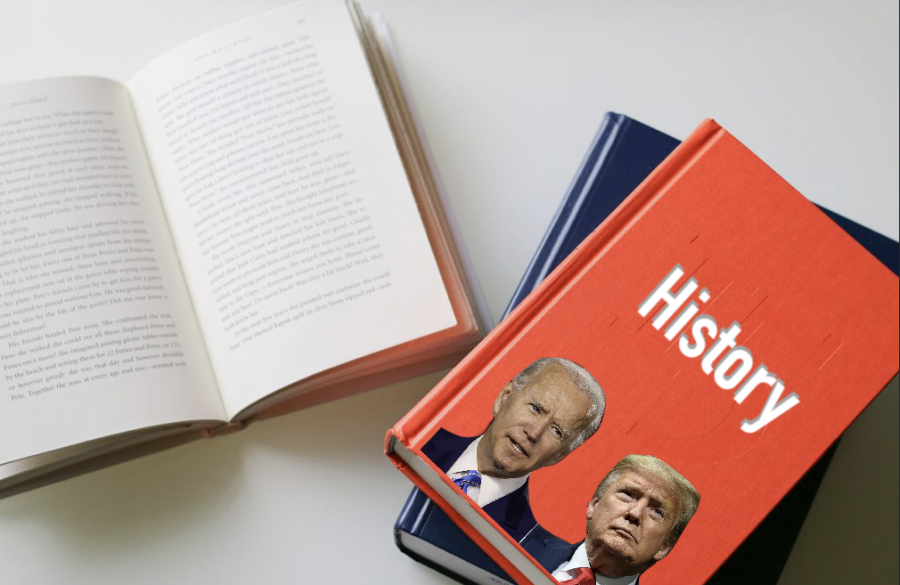RB history teachers reflect on the 2020 election
History books showing the 2020 presidential election candidates, Joe Biden (democrat) and Donald Trump (republican).
November 22, 2020
With the 2020 presidential election coming to an end and officially projecting Joe Biden as president and Kamala Harris as vice president, there still remains controversy on the integrity of the election, and the rocky path the race took a turn on. History teachers from RB reflect on what potentially this election could mean for the future of our country.
Throughout the past four years, under the presidency of Donald Trump, it highlighted the conflict between the two dominant political parties in our nation. As the conflict continued to divide the political parties, it showed its true colors during this election. Due to that, there are many things you can point out about this election that stood out compared to others.
“2020 has obviously been a challenging year for everyone. I think one big positive was voter turnout. The 2020 election saw the greatest number of people vote in American History and the highest percentage of eligible voters in over 100 years. We have had several groups who have turned out in record numbers in the 2020 election,” AP U.S. History teacher Ryan Grieve, said.
With the increase in mail-in ballots for this election due to the COVID-19 pandemic, President Donald Trump, his supporters, and others questioned the integrity of the election. Despite President Trump’s push for a recount, there is no argument that this election didn’t break records. At least 161 million Americans voted in the 2020 election, the largest number of voters in a U.S. presidential election in history. Amongst those Americans, over 74.4 million voted for presidential elect Joe Biden, the most votes a presidential candidate has ever gotten in American history.
“Even though the country feels very divided over many issues I believe this [the voter turnout] is a great takeaway. The younger generation should be very proud about voter turnout and I hope it continues on a state and local level going forward,” Grieve said.
Even though this election seemed to determine the “fate of America,” to many Americans, there are similar election experiences in the past that could possibly remind us of the messy election of 2020.
“I think we often forget some of the drama that occurs in every election cycle, and therefore it makes the most recent election seem worse,” fellow AP U.S History teacher Dan Monahan said. “In 2000, for example, we didn’t know the outcome until mid-December and there was plenty of controversy surrounding the outcome.”
With social media being an outlet for a lot of political controversies, it’s easy to get caught up in how difficult politics can be. Sometimes, allowing American citizens to forget that political controversy has been relevant in many elections prior.
“Even in 2016, many democrats were astounded that Trump won the Electoral College, and they hoped that ‘faithless electors’ would not cast electoral votes for Trump,” Monahan said. “And if you look way back in history, the election of Abraham Lincoln in 1860, for example, triggered secession and the Civil War.”
Along with social media becoming an outlet to political topics, it became a big source of political activism for younger generations like Gen-Z and Millenials. Social media apps like Instagram, Tik Tok, and Twitter, pushed for everyone to vote and make sure their voices were heard.
“I think our country is strongest when the younger generation gets out to vote. As a social studies teacher, I feel it is extremely important for students to be actively engaged in their community and play a role in the democratic process,” Grieve said. “I hope Gen-Z and millennials, along with everyone else, continue to use their voices and engage in positive political discussions moving forward.”
Adding to the controversy, many people doubted the electoral system the nation currently upholds. Debates on whether or not the electoral college accurately represents democracy was an active topic during the election.
“The United States has a very unique way to determine the president in using the electoral system. It has been around since the beginning of our country’s history. Many people across the country on both sides of the political aisle have questioned if this is the most effective way to choose the president,” Grieve said. “Some have suggested using the popular vote for the entire country, others have suggested using proportional representation; while some believe it is best to keep the electoral system as it currently stands.”
Analyzing the takeaways from the 2020 election, there are still many questions the American people are left to wonder about. What does this mean for the future of our country? How does the election represent the United States as a nation?
“As long as there is a smooth transfer of power, I don’t think this election will mean any more than any other election,” Monahan said. “It might be historically significant if President Trump is able to remain a political force after leaving office and/or runs for president again in 2024.”
While some people might not be worried about the sake of our nation after this election considering what has happened in American history and previous elections, some still believe that this will have a long-lasting effect on the country.
“I think we all will look back at 2020 as a very challenging year and one with a lot of personal, local, national, and global issues. My hope is that we as Americans can make positive changes moving forward to ensure everyone’s voice matters and people feel welcomed in the United States. Hopefully, 2020 is looked back at by historians as a challenging year, but also one where many positives came out of it as a result,” Grieve said.




